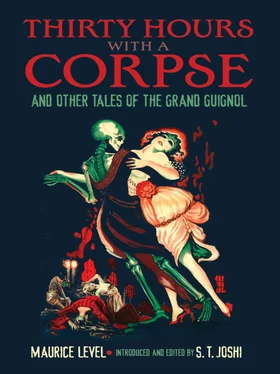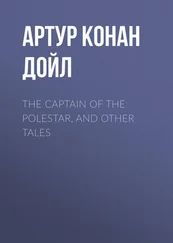“I was quartered in her house.”
“Ah! Mon Dieu! How is she?”
“She is well—very well. She is a very worthy person and I suffered from the annoyance which our presence caused her. I, too, have an old mother in Magdeburg, and I thought of her when I saw your mother weeping. But such is war!”
The doctor breathed freely. Big tears ran down his cheeks. But he collected himself, and, bending again over the wound, he announced:
“We are going to put you to sleep right away. It is nothing serious. You will soon be well.”
While they washed the wound with tincture of iodine and an assistant got ready to administer ether, the wounded man gave some more details:
“Yes, your mother is well and suffers no inconveniences. The house is always in order, as if for a fête. Her rooms are so neat and the floors so scrupulously polished that it is a pleasure to look at them in passing. She waters her flowers; she trims her rose bushes. An attractive house! A fine woman!”
Then his voice wavered a little; he grew stiff; soon he relaxed and softly passed into slumber.
In the midst of the operation he gave a start, turned his head to one side and babbled some meaningless words. The assistant was about to administer more gas, but the surgeon stopped him.
“Not too much. We are nearly through.”
The prisoner began to talk again. This time his words were precise, his phrases clean-cut. His voice, which a little while before had been so calm, became harsh and imperious, and he smiled between his phrases with a huge smile which shook his abdomen and his arms.
“Go ahead! Go ahead! Take that old wardrobe out and burn it! Break it open for me first! Linen? That’s good to wipe our shoes with. What does she say? A spigot for the wine casks? Ho, there, the rest of you! Get an ax and draw the wine out in buckets.”
The doctor’s hand trembled.
“Hurrah!” the wounded man went on. “Seize the old woman! Tie her to a chair if she is obstinate! She has a son who is an officer? Ha! Ha! Slap her on the head till she gives us the key to her strong box!”
The old doctor stood erect, very pale. For an instant his terrible eyes ran from his fingers to the neck of the Boche. Then, in a very low voice he said to his assistant, as he bent down again:
“Give him a little more gas. Unless you do so I am afraid I can’t go ahead.”
THE HOUSE of M. Hermann was the third to the left on the Place au Cuir, facing the market. A shop occupied the ground floor—a gloomy ground floor, where it was often necessary to light the lamps before sunset.
In the springtime the linden trees on the sidewalk filled it with a perfume of honey, which mingled with the crude odor of linens and cottons. When winter came, one saw the storks, abandoning Alsace, fly by just over the roofs in a long, noisy train.
Hidden in the back of his shop, ignoring Sundays and feast days, M. Hermann came and went, pushing his ladder, rolling and unrolling his pieces, stopping only to verify his change, to measure his cloth twice, to sell to his patrons bodices and blue blouses, or trousers, which kept for weeks, in spite of the rain and wind, the deep creases worn in them on the shelves. Once a year he closed his shutters and disappeared. Then the neighbors said:
“M. Hermann has gone to Haguenau to gather his hops.”
Because M. Hermann had still down there his old parents, a little farm and a house—a fine house, which the Prussians had turned into a casino for the officers, since it stood near the new barracks.
He was there on July 30, 1914, and returned on the day when they posted on the walls the notice of mobilization. The whole village was celebrating. The old people smiled and rubbed their hands. The young people went away singing, their bags over their shoulders. Standing on his front doorstep, he watched what was going on, but said nothing. Presently the Mayor, M. Schmoll, a veteran of the War of 1870–71, came up to him and slapped him on the shoulder, exclaiming:
“This time, Monsieur Hermann, they are going to get back our old country for us. And the thing will not be dragged out. Before the storks sing their farewell I wish to see, in Strasburg, if my chop is still waiting for me in the Café à la Mésange, at my old table near the wine tun.”
M. Hermann nodded his head gravely and answered:
“I hope you may find it there, Monsieur Schmoll.”
That same evening a squadron of dragoons passed through the village on a trot. The next morning a battalion of chasseurs made a brief halt. The people pressed about them on the main road, throwing them flowers, and crying “au revoir” to the soldiers.
Then for two days one heard nothing and saw nothing but a French airplane, which wheeled for a moment in the sky and then disappeared. But on the third day, early in the morning, they heard a distant cannonade, and about 2 o’clock the chasseurs passed through again without singing, gray with dust, followed soon by gendarmes, weary and begrimed. The gendarmes stopped in the village square. The inhabitants came running to hear the news. M. Schmoll, the mayor, very pale, came up and asked:
“Have things gone wrong, brigadier?”
“They didn’t go very well, Mayor. We are retreating, and the Boches are following us closely. The women and children and all the young men between sixteen and nineteen will have to leave the village. They must start within two hours. It is the provost’s order.”
M. Schmoll read the paper, folded it, and put it into his pocket. Then, turning to the group around him, he said:
“My friends, you have heard what the brigadier said. You must leave. Only those whom duty or advanced age detains may stay behind. You others, put your most valuable possessions in wagons, lock your doors and go!”
He stopped there, because his emotion choked him. Gathering himself together again he added:
“But it will not be for long, if it please God.”
About 5 o’clock the Germans entered, playing their fifes and beating on their flat drums. Before the mayor’s office, wearing his scarf, his military medal, and his medal of 1870 pinned on his coat, M. Schmoll awaited them.
First they seized the post office and the railroad station. Then they requisitioned forage and wine. Finally, the sentinels having been placed, the officer who commanded the troop said:
“You will guarantee with your person the security of my soldiers. If one of them is insulted I shall arrest you. If one of them is injured you shall be hanged.”
M. Schmoll straightened out his angular figure.
“So long as your men respect the lives and honor of the inhabitants, no one will do them any harm. That is all that I can guarantee you.”
The officer slapped his boot and grinned.
“Agreed. And now take me to Hermann, the draper.”
M. Schmoll was speechless for a minute.
“Hermann, the draper? Do you know him?”
“Probably. Let’s go.”
M. Schmoll bit his lips and obeyed.
When he saw the officer and the mayor enter, M. Hermann came to the door of his shop, putting on his spectacles. The officer took a seat at the counter, looked around, and said:
“Your house at Haguenau is more comfortable than this one, M. Hermann. But, no matter. Take a chair. You are an intelligent man. I want to talk with you. How many head of cattle are there in the village?”
M. Schmoll interrupted.
“Monsieur Hermann is not authorized to answer that. I alone—”
“You will speak when I address you,” said the officer. “Answer me, Monsieur Hermann.”
“But, Monsieur le Commandant,” the merchant protested, “it is very difficult for me to give you anything like an exact answer. I do not know very precisely.”
Читать дальше












